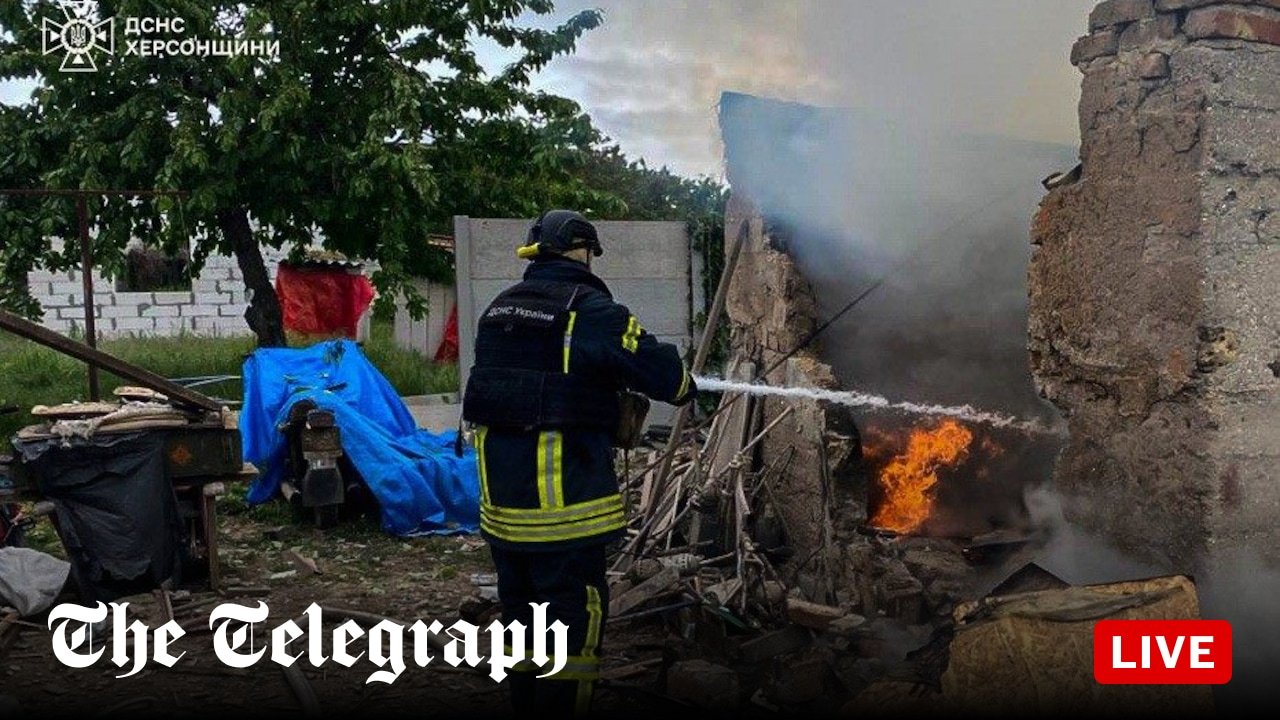European nations have warned Vladimir Putin that he has until the end of the day to accept a 30-day unconditional ceasefire – or face further sanctions.
“The clock is ticking, we still have 12 hours until the end of the day, and if the ceasefire is not in place by then, the European side will [set in motion] preparations for sanctions,” a German government spokesperson said.
European leaders called on Putin on Saturday to accept the temporary truce, which he later rejected, instead proposing direct talks with Ukraine on Thursday.
Mr Zelensky, at the insistence of Donald Trump, said he was ready to meet Putin in Turkey but stated that Kyiv was waiting for a “full and lasting ceasefire” starting on Monday as the “necessary basis for diplomacy”.
In defiance of the ceasefire ultimatum, Russia launched a barrage of 108 drones at Ukraine overnight, Kyiv said.
Ukraine’s allies have long said that a ceasefire is a precondition to direct talks.
On Monday, they repeated that demand and accused Russia of “playing games”.
“In order to go into any peace talk, there has to be a ceasefire,” Kaja Kallas, the EU’s top diplomat, said in London ahead of a meeting of European ministers. “We need to put the pressure on Russia because they are playing games.”
Britain and foreign ministers from Europe have vowed to boost support for Ukraine as Russia continues to reject calls for a ceasefire.
David Lammy, the UK Foreign Minister, along with his counterparts from France, Germany, Italy, Poland and Spain plus an EU representative, discussed how to further support Ukraine against Russia at a meeting in London.
“We discussed how we would further step up European efforts to support Ukraine in its ongoing defence against Russia’s war of aggression,” a joint statement for the Weimar+ group read.
“Ukraine should be confident in its ability to continue to resist successfully Russian aggression with our support.”
A game of brinkmanship is afoot. On Thursday, Volodymyr Zelensky, Ukraine’s president, will be seated at a negotiating table in Istanbul. The question is whether Vladimir Putin will be opposite him.
After a weekend of frantic diplomacy, in which Sir Keir Starmer joined the leaders of France, Germany and Poland in Kyiv, the Russian president finally made his move.
He did not, however, yield to European demands for an immediate 30-day ceasefire or face yet more sanctions. Instead, he offered a counter-proposal: direct talks between Russia and Ukraine in Turkey – but no silencing of the guns.
In the capitals of Europe there are serious, if slender, hopes of a diplomatic breakthrough to end the war in Ukraine. But make no mistake, this was not a genuine concession from Putin; it was a manoeuvre – a manoeuvre that, for the moment, has found favour in the White House.
Emmanuel Macron has denied bringing cocaine onto a train headed to Kyiv for a meeting with Volodymyr Zelensky and Ukraine’s European allies.
On Monday, his office took the unusual step of addressing a video that showed the French president hiding a white object as he sat alongside Sir Keir Starmer and Friedrich Merz, the German chancellor.
The footage had gone viral over the weekend due to the mystery object’s apparent resemblance to a bag of the class A drug.
The video was shared widely by Kremlin-backed social media channels. In reaction, Maria Zakharova, Russia’s foreign ministry spokesman, claimed that “the fate of Europe is being decided by utterly [drug] dependent individuals” and accused Mr Zelensky of being an “unstable drug addict”.
The Kremlin said Monday it was focused on “serious” ways to achieve long-term peace with Ukraine, despite ignoring European demands for a 30-day ceasefire.
“We are focused on a serious search for ways to achieve a long-term peaceful settlement,” Kremlin spokesman Dmitry Peskov said.
He did not comment on Volodymyr Zelensky’s invitation for a personal meeting with Vladimir Putin on Thursday in Turkey.
The Kremlin on Monday said “ultimatums” to agree to a ceasefire in Ukraine were “unacceptable” after EU leaders said Moscow had until midnight Monday to agree to a joint proposal with Kyiv for a 30-day halt to the fighting.
“The language of ultimatums is unacceptable to Russia, it is not appropriate. You cannot talk to Russia in such a language,” Dmitry Peskov, the Kremlin spokesman, said on Monday.
Turkey’s foreign minister has urged Russia and Ukraine to come together “as soon as possible” to start a ceasefire agreement ahead of planned talks in Istanbul this week.
“We invite the parties to come together as soon as possible and start the ceasefire,” Hakan Fidan told a joint press conference in Ankara with his Syrian and Jordanian counterparts, expressing confidence the warring sides would “come together for a compromise in the coming days”.
Russia has been “completely ignoring” a 30-day ceasefire proposed by Kyiv and its allies and is attacking “all along” the front line, Ukraine’s foreign minister has said.
“Russians are completely ignoring the offer of a full and durable ceasefire starting on May 12. They continue to attack Ukrainian positions all along the frontline,” Andriy Sybiha wrote on X after an online meeting with Ukraine’s Western allies.
Foreign Secretary David Lammy called on Vladimir Putin to “get serious about peace” in Ukraine on Monday, as he hosted key London talks backing calls for a swift ceasefire.
Ministers from France, Germany, Italy, Poland, Spain and the EU joined Mr Lammy for a meeting of the so-called “Weimar+” group.
“This is the time for Vladimir Putin to get serious about peace in Europe, to get serious about a ceasefire and to get serious about talks,” Mr Lammy said on Monday.
He warned that European countries must “be prepared if this is not the moment of seriousness from Putin and we do not get that peace”.
Copy link
twitter
facebook
whatsapp
email
Ukraine-Russia war latest: Agree ceasefire today or sanctions get worse, Putin told – The Telegraph



